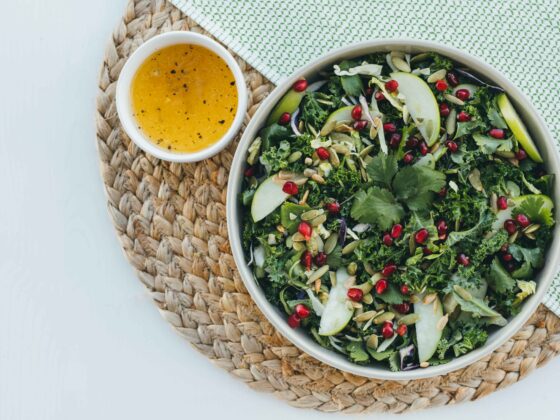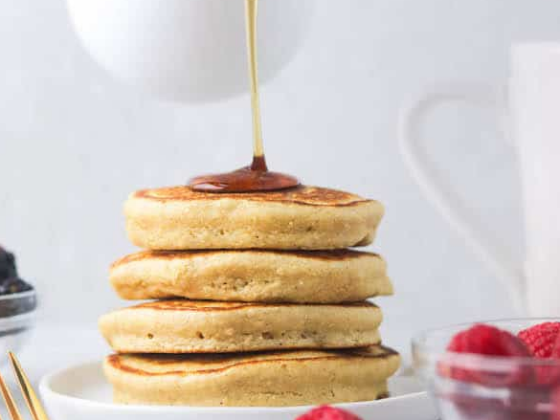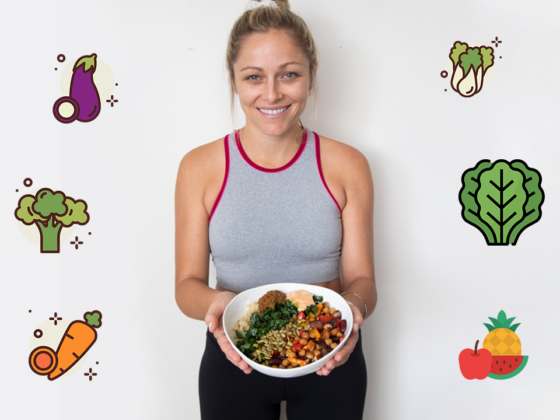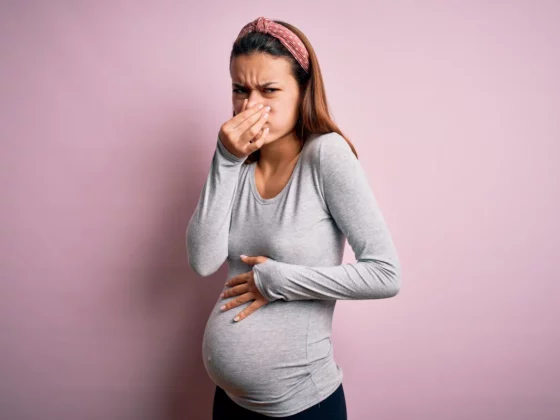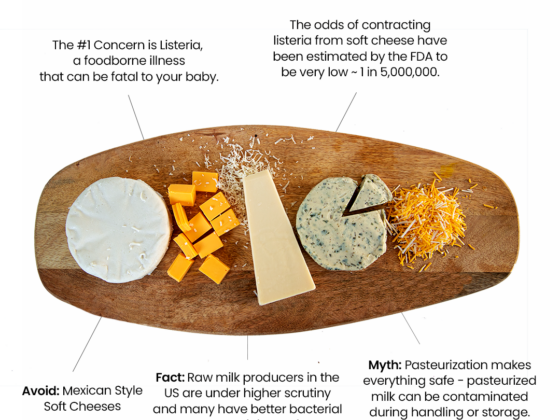
Now that you are expecting, you have probably heard your fair share of nutrition advice from well-meaning family members, your favorite instagrammer, and your BFF. The tips can stem anywhere from large-scale clinical trials to old-wives-tales.
Generally speaking, it is best to stay on the safe side when choosing your foods when you are pregnant. The last thing anyone wants is to put your baby (or you) in danger. Use this as a guide, but as always follow any advice your health care provider gives you as a first choice.
- Unpasteurized cheese. Eating unpasteurized cheese can expose you to listeria, and can make you and your baby very sick. The good news is that most cheeses served in US restaurants are pasteurized, but on occasion you may get an unpasteurized option. Check your food label when shopping for yourself and ask your server when at a restaurant. And when in doubt, go without.
- Raw Fish. When looking at the data and what other countries recommend we found that in places like Britain and Japan raw fish was a common thing for women to consume. This is because flash-freezing is used for most sushi-grade fish which inactivates parasites. So, here are some guidelines to follow when consuming raw fish:
– Make sure the fish consumed is sushi-grade & Flash Frozen
– It has been stored properly
– You are eating at a reputable establishment
– You consume it in a reasonable amount of time
Fishes to avoid entirely during pregnancy:
– Swordfish
– Tile Fish
_ King Mackerel
– Shark
– Albacore tuna to less than 6 oz per week
No Raw Shellfish (Clams and Oysters) – raw shellfish accounted for 75% of outbreaks of food-borne illness associated with seafood.
A good rule of thumb for fish to eat – eat smaller fish that have a shorter lifespan – they contain less mercury.
- Raw bean sprouts. Although these sound like one of the healthiest foods in the world, they may expose you and your little one to listeria and E. Coli. Skip the raw bean sprouts and choose nuts or raw pea pods if your dish needs that distinctive “crunch”.
- Cold deli meats. You are going to want to avoid grabbing a quick sub at the deli counter if you are used to choosing deli meats as your protein source. These meats can harbor listeria and in extreme cases can result in miscarriage. If you simply heat your meat to 145-165 degrees (Farenheit) to “kill off” any bacteria, you should be safe to enjoy your deli meats. If you don’t want to go through that effort, peanut butter and jelly sandwiches or hummus, tomato & avocado are always a good idea!
- High mercury seafood. Seafood is an excellent source of many essential nutrients you need during pregnancy, and eating two servings a week is recommended by many expert panels. You may be asking why it is recommended to only eat seafood twice a week if it is so good for expecting mamas. The reason is because fish may be exposed and contaminated with heavy metals including methylmercury. The goal is to take in low-mercury containing fish and seafood to increase exposure of many key nutrients while minimizing exposure of this harmful contaminant. Shark, swordfish, king mackerel, and tilefish are known to contain high levels of mercury, and therefore should be avoided when pregnant.
- Raw and unpasteurized eggs and milk. Unfortunately, this recommendation includes a lot of goodies: raw cookie dough, some homemade ice creams, and hollandaise sauce to name a few. Raw eggs may contain salmonella, a bacteria that when ingested can cause serious side-effects. There are plenty of sweet options that are less-risky, and if you must have that cookie dough you can always make it yourself using pasteurized eggs.
- Cut melons and fruit that were not washed. This one may sound a bit misleading, and we are not saying to avoid fruit altogether! The skin and rind of many fruit may house bacteria that have the potential to cause some pretty terrible symptoms. For this reason, washing the skins and rinds of any fruit you need to cut is recommended (think watermelon and honeydew, for example). If you do not wash the food before cutting, the knife may become exposed to the contaminant and expose the edible part of the food before you eat it, leading to foodborne illness.
- Certain teas. You may be cutting back on your caffeine and thinking that teas are a great substitute for that extra cup of coffee you are now giving up. Not so fast! Although teas like spearmint, roobois, and raspberry tea (in late pregnancy) is safe, others like licorice root tea and ginseng should be avoided. Also be mindful that many teas contain caffeine, so if you are trying to minimize your intake, tea may not be your best-bet.
- Alcohol. This is a hot-topic these days, and the opinion on this one is across the board. If you want to go by what the Center for Disease Control and Disease says, you should avoid it while you are expecting. By making the statement “when a pregnant woman drinks alcohol, so does her baby”, it takes a bit of the enjoyment out of sipping that cocktail! Having said that, many doctors feel that mothers may enjoy one drink during their third trimester with no consequences. Ask your personal doctor about her opinion on the topic if you need a definitive recommendation.
- Caffeine. Although coffee has it’s benefits (like providing antioxidants to the body), it is known to contain caffeine that, if consumed in high amounts, may be harmful to the fetus. Coffee doesn’t have to be avoided altogether, but it is generally recommended to limit consumption to 2 cups max (of regular drip coffee, not a triple-shot-venti). Decaffeinated coffee may contain some caffeine, but not nearly as much as the real-deal and is a great substitute if you are used to having more than two cups a day.

